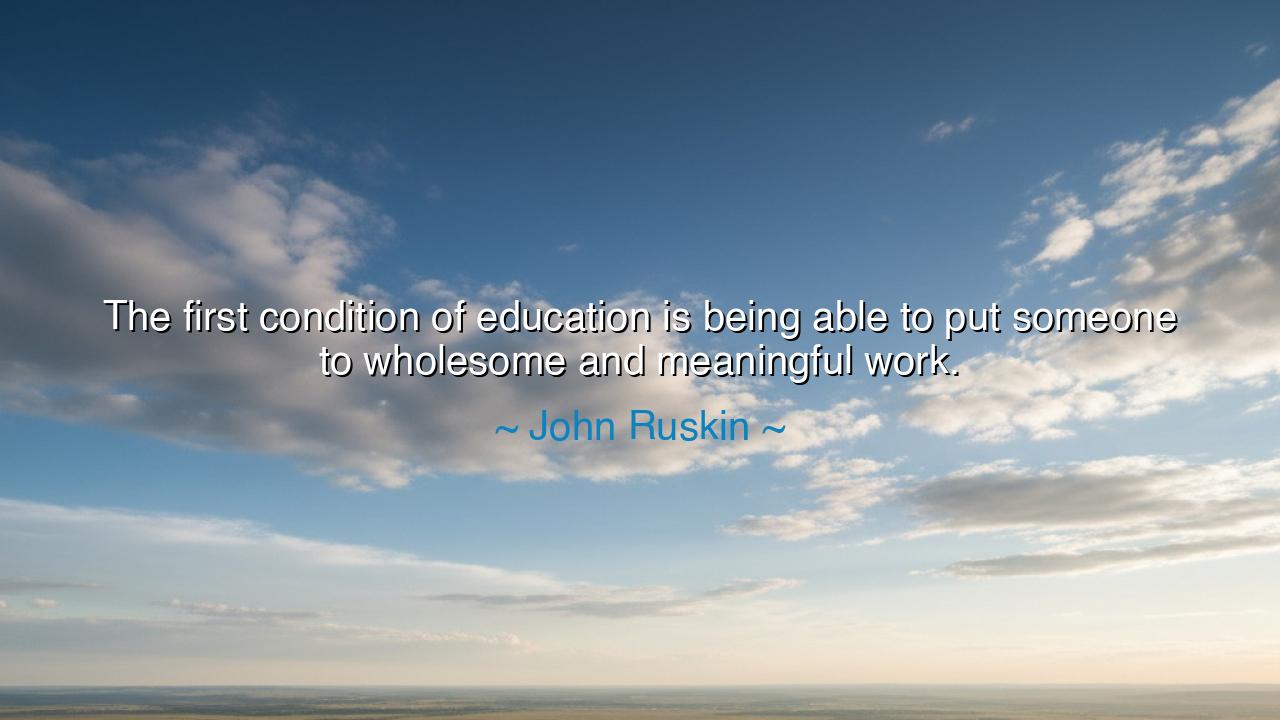
The first condition of education is being able to put someone to
The first condition of education is being able to put someone to wholesome and meaningful work.






"The first condition of education is being able to put someone to wholesome and meaningful work." So spoke John Ruskin, the great Victorian thinker, artist, and social reformer, whose heart was both poetic and prophetic. In this single line, Ruskin revealed a truth that has echoed across centuries: that true education is not the mere filling of the mind with facts, but the awakening of the soul to purposeful labor. He believed that knowledge without application was like a well without water—grand in form, but barren in life. To educate, therefore, is to lead a person not only to understanding but to usefulness, not only to thought but to action that is good and just.
Ruskin lived in an age of great industrial power, when machines began to replace craftsmen and labor became divorced from meaning. He saw children trained not for life, but for profit; workers taught not to create, but to comply. Against this tide of soulless progress, he raised his voice like a prophet crying in the wilderness. For him, wholesome work meant labor that nourishes both body and spirit—work done with dignity, rooted in craftsmanship, honesty, and beauty. He warned that an education which prepares men and women only for material success is a betrayal of the human spirit. True education, he said, must teach one how to live, how to serve, and how to build a world worth inheriting.
To understand Ruskin’s wisdom, we may look to the story of Mahatma Gandhi, who, though born long after Ruskin, was deeply inspired by his writings—especially the book Unto This Last. Gandhi, then a young lawyer in South Africa, read Ruskin’s words and was transformed. He saw that the truest form of education was not learned in lecture halls but in service to others. He founded schools where students learned not only literature and science, but also spinning, farming, and community work—meaningful labor that bound intellect to compassion. Gandhi believed, as Ruskin did, that through good work the mind becomes disciplined, the heart purified, and the soul awakened to its divine purpose.
In the ancient world, this harmony between learning and labor was a sacred principle. The philosophers of Greece, though devoted to reason, understood that wisdom must find expression in the world. Plato spoke of education as the training of both the body and the soul; Confucius taught that the highest learning was found in duty and service. Even the builders of cathedrals and temples—those unknown artisans of faith—were living examples of Ruskin’s teaching. Their hands labored in stone, but their minds were guided by vision. Their work was wholesome because it joined the physical and the spiritual, the useful and the beautiful.
Ruskin’s words carry a warning for our own age, no less than his. We have filled our schools with technology and competition, yet too often we forget the heart of education—to make a human being whole. We teach how to calculate profit, but not how to discern purpose; how to achieve, but not how to serve. The young are taught to chase careers, not callings. Thus, the world is full of skilled minds but restless hearts. Ruskin would remind us that no education is complete unless it leads a person to work that uplifts, heals, or creates—that contributes, in some small way, to the harmony of the human family.
What, then, is wholesome and meaningful work? It is any labor done with integrity, guided by conscience, and touched by love. It may be the craftsman shaping wood, the teacher nurturing minds, the farmer tending soil, or the artist painting truth. Such work feeds the soul because it connects the worker to life itself. It gives not only wages but worth. It transforms toil into prayer, skill into service, and knowledge into wisdom. The educated person, Ruskin would say, is not the one who knows the most, but the one who works with purpose and lives with compassion.
Let this be the lesson we carry forward: seek not education for its prestige, but for its power to make you useful, good, and alive. Do not chase knowledge as if it were treasure to hoard, but as light to guide your hands in service. Ask not, “What can I gain from my learning?” but “What can my learning give to others?” For the first condition of true education—as Ruskin taught and the wise have always known—is not mastery of knowledge, but the discovery of meaningful work that ennobles both the worker and the world. In that labor lies the highest form of wisdom, and in that wisdom, the fullness of life.






AAdministratorAdministrator
Welcome, honored guests. Please leave a comment, we will respond soon